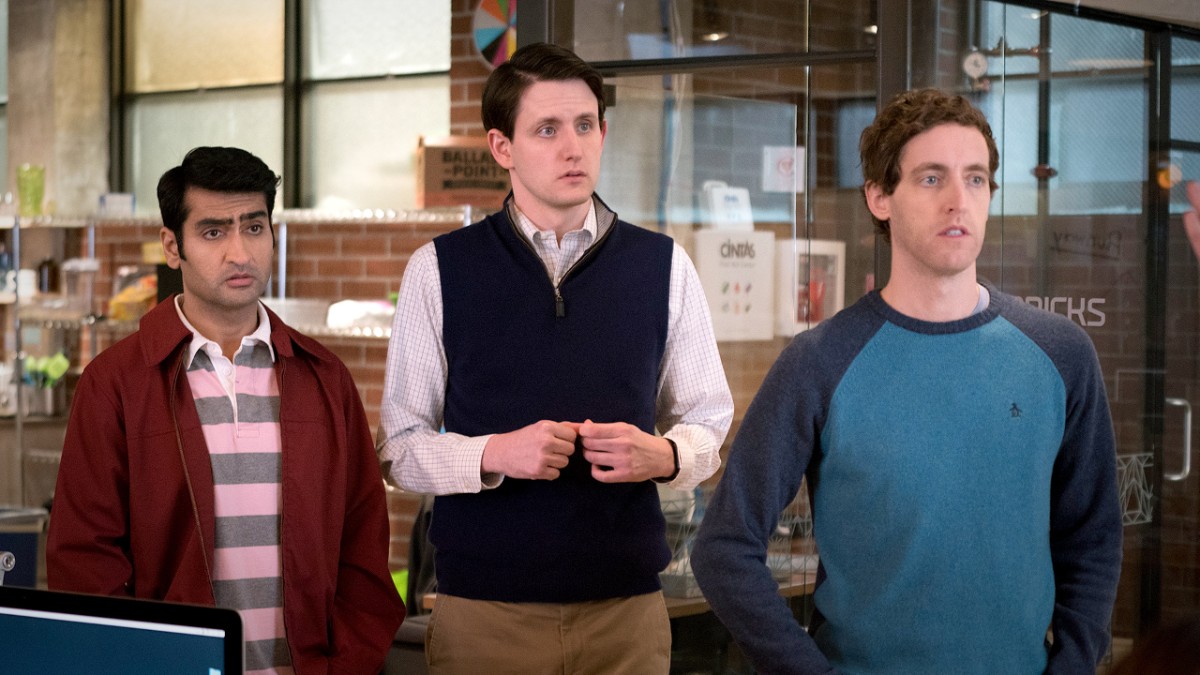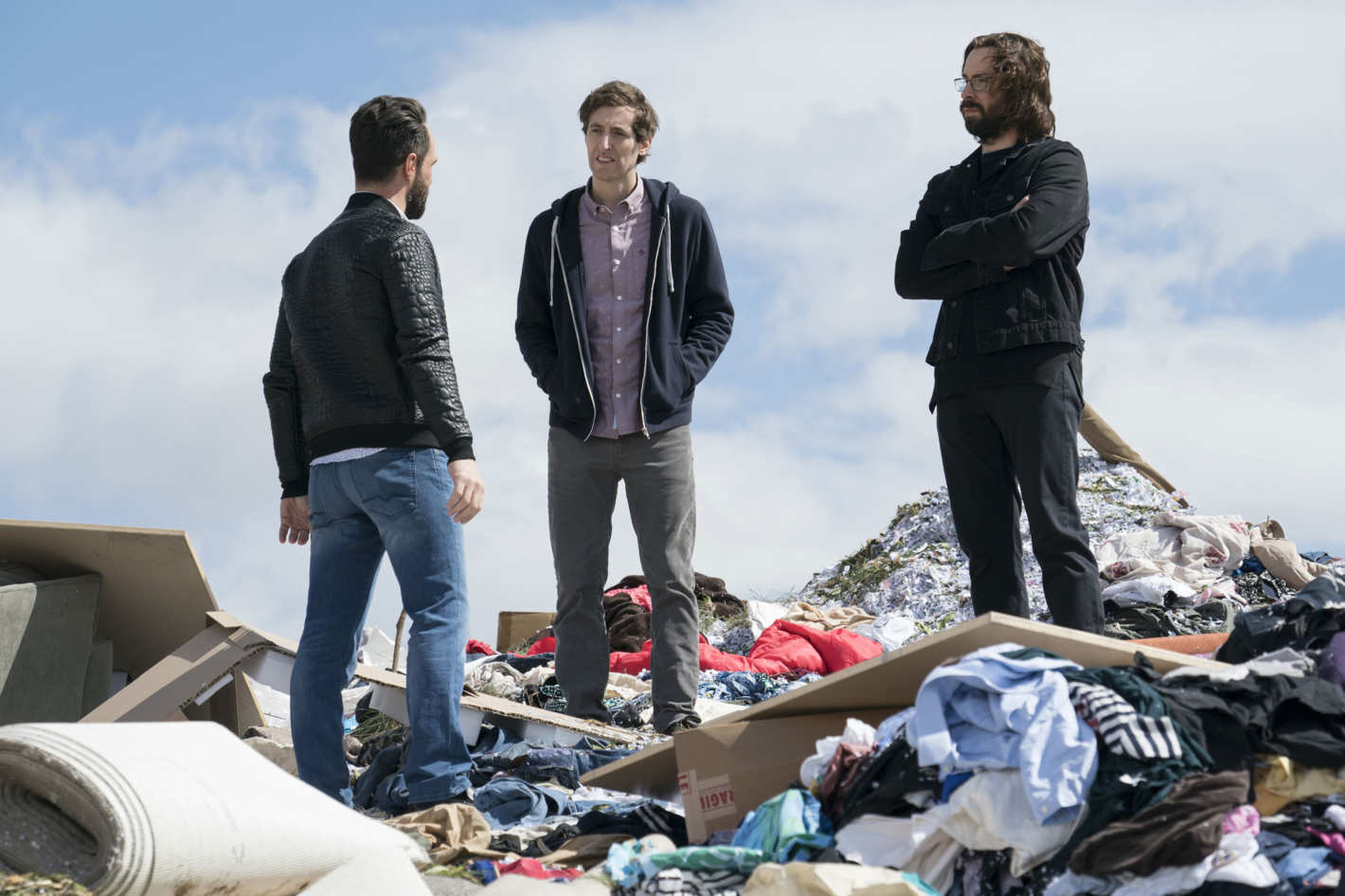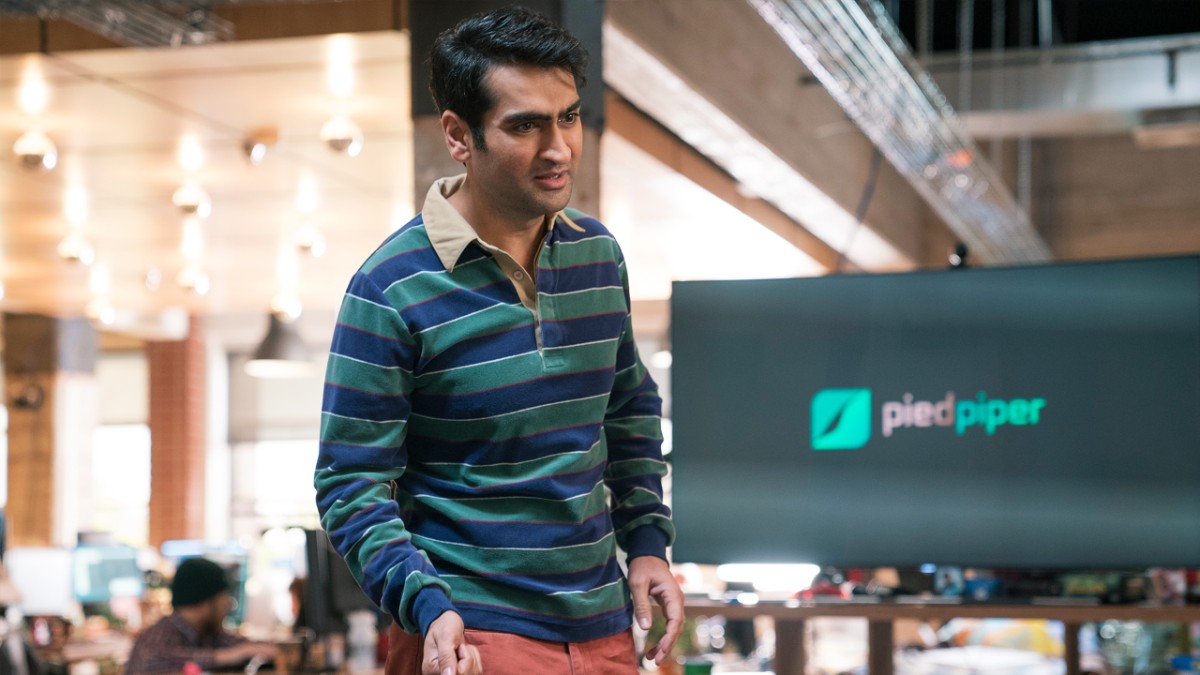![]()
In the defining scene of Silicon Valley season three’s incredible premiere, Dinesh Chugtai and Bertram Gilfoyle discuss whether or not to step down from Pied Piper in solidarity with Richard Hendricks. It’s pretty blatantly obvious that quitting would be a bad decision and that, furthermore, Richard’s assumption that they would quit on his behalf is absurdly self-involved– especially since he doesn’t even try to take steps to ensure anyone that quit along with him would have a job to move onto. Dinesh and Gilfoyle feel like they have to preface everything they want to say about this with the disclaimer that Richard is a great guy and a very talented coder, so they come up with a shorthand– RIGBY, meaning “Richard is Great, But, You Know…” A scene of Dinesh and Gilfoyle quickly saying “RIGBY” before and after all of their angry statements provided some great comedic deliveries from Kumail Nanjiani and Martin Starr, but this scene also did much more. It tapped into the strange duality of Silicon Valley, which is somehow simultaneously a well-crafted underdog story and a satire of entitled nerd culture.
Richard is Great: Richard Hendricks is easily one of the most compelling protagonists on TV right now. His incredible talent has always been apparent, yet he’s constantly held back by a lack of social skills and a system stacked in favor of big corporations. Over the past two seasons, his victories and setbacks have affected me on a visceral level because every twist and turn of the show is written in such an emotionally resonant way. He’s also an incredible portrayal of living with anxiety and social disorders.
But, You Know…: From the moment he made his cringeworthy speech about how hard it is for “guys like us,” Richard Hendricks has always represented the worst of white male entitlement and nerdy guy victim complex. He’s a character who was offered $10 million dollars at the age of twenty-six. He’s also a bad CEO. This is a man who started his own company and then had to read the Wikipedia page on “business plan.” His hissy fit over being demoted to CTO is especially eyeroll inducing when you consider that this is for the most part exactly what he’s always wanted. Last season’s premiere opened with him lamenting that he just wants to build Pied Piper and hates the business aspect of it. The fact that he hated all the corporate stuff but was forced to do it was a big part of what made him sympathetic, but now when he’s given the chance to focus solely on being the head of engineering, he takes it as an insult and quits in anger. There’s no logical reason to root for Richard Hendricks other than the fact that he’s written in an emotionally resonant way. He doesn’t actually deserve to come out the victor in this story.
This weird duality has never been outright acknowledged by the show before and it was a bold, smart and necessary move on the part of the show that, just when I’m really starting to hate myself for how much they made me care about Richard, they go all in on reminding us that at the end of the day he is a satire about how the brilliant coders of Silicon Valley shouldn’t necessarily be put in the position they’re put in to change the world simply because of their technical prowess. By giving us RIGBY the show is essentially saying Richard is great, but, you know… don’t make the mistake of glorifying this industry or the people in it.
When Dinesh and Gilfoyle tell Richard that they won’t be leaving Pied Piper, he’s completely shocked. Richard operates in blind loyalty and is consistently surprised and offended when other people don’t– this episode recalls the early episode when Richard wanted to give equal shares to Big Head simply because he’s part of his friend group and never fully understood why this was such an insult to the rest of the team. The ensuing fight in which Richard tells Dinesh and Gilfoyle that they won’t be able to scale out without him, and completely dismisses their contributions to Pied Piper’s tech, is a great demonstration of how important it is for scenes to be character-driven. There’s no over the top fighting or yelling or crying in this scene, but it’s a complete punch to the gut because of who these characters are. While Richard sees loyalty as the most important thing in life, Dinesh and Gilfoyle value skill and hard work. Because of this fundamental difference between them, I don’t think Richard understands just how insulting the way he talks about Dinesh and Gilfoyle’s lack of abilities is to them. It also shows the darker side of a part of Richard’s personality that can often be interpreted as sweet naivety. The fact is that while, sure, he always stands by his friends, we see in the way he immediately disparages Dinesh and Gilfoyle’s real contributions that in his mind they are always first and foremost just along for the ride because they’re his friends. His tendency to lash out at people who dare to do the reasonable thing instead of constantly supporting him is ugly and this isn’t the first time we’ve seen it. This scene reminded me of the scene in last season’s premiere when Monica Hall, at risk of getting herself fired, warned Richard about the dangers of overvaluing his company and his immediate instinct was to get angry at her for not complimenting him.
At the end of this scene, a wounded Gilfoyle (Starr makes a great choice of foregoing Gilfoyle’s usual stoicism and letting us see how hurt he is) declares that we’re officially post-RIGBY. This fundamental shift of clearing up any ambiguity there might’ve been in how much of a nice guy Richard is perfectly sets up the major question of the season. Will Richard get a redemption arc, now that we’ve admitted he needs one, or will this season just show him on a collision course towards becoming Gavin Belson?
With Richard jumping to threatening to sue everyone who dared to wound his ego and being deeply offended by his friend’s refusal to throw their careers away for him, Richard turning into Gavin now seems less like a looming possible Darkest Timeline and more like the sad but inevitable conclusion to this story.
















Pingback: Best Comedy Episodes of 2016 - It's Always Sunny in Philadelphia & More